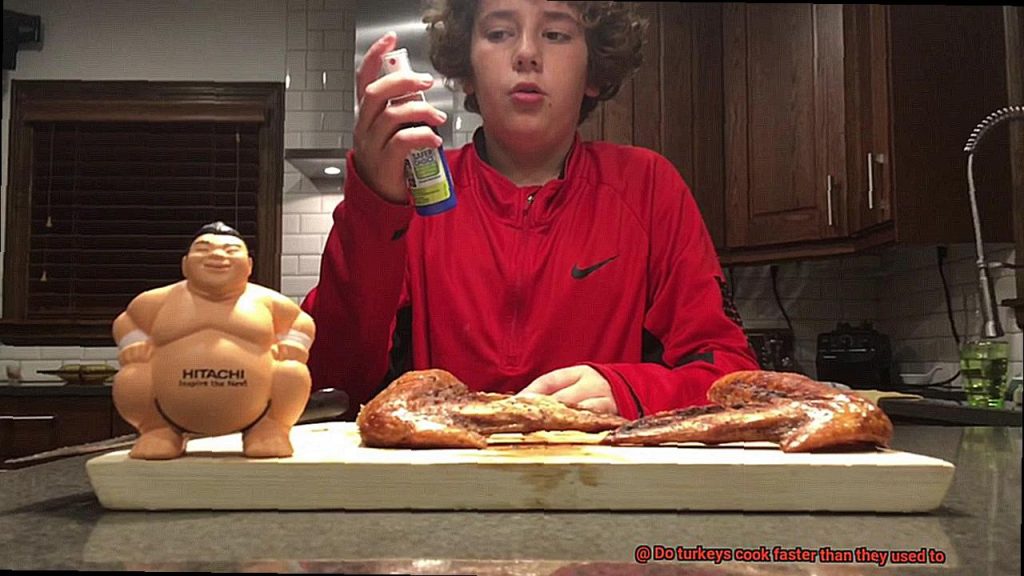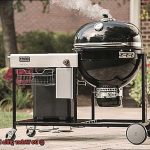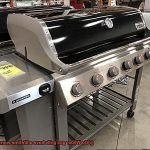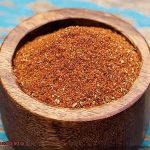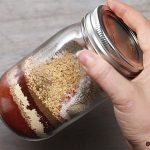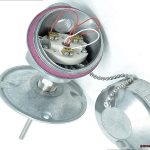It’s that time of year when the smell of barbecue is in the air and the sizzle of meat on the grill is music to our ears. And when it comes to grilling, Weber is a name that has become synonymous with quality and reliability. But as much as we love our Weber grills, we can’t help but wonder – do they rust out over time?
Rust can be a real buzzkill for any grill enthusiast. Not only does it look unsightly, but it can also pose safety risks. Rust weakens metal, making parts unstable and prone to breaking off during use. And let’s not forget about how it can affect the taste of your food.
So what’s the verdict? Well, like most things in life, the answer isn’t black and white. Weber grills are built to last with high-quality materials and a porcelain enamel coating that protects against rust and corrosion. But if that coating chips or cracks, then the metal underneath becomes vulnerable to rust.
In this blog post, we’ll delve deeper into Weber grills and explore some of the reasons why rust may occur. We’ll also share some tips on how you can keep your grill looking shiny and new for years to come. So sit back, grab your favorite beverage, and let’s get started.
Contents
What is Rust?
Rust is a common term used to describe the natural process of corrosion that occurs when iron or steel is exposed to moisture and oxygen. This electrochemical reaction causes the metal to break down and form a reddish-brown coating of iron oxide on its surface. The consequences of rust can be dire, as it weakens the structural integrity of metals, making them brittle and prone to breaking or cracking.
The process of rusting is accelerated by the presence of salt and other contaminants in the environment, which is why it’s particularly common on outdoor equipment and structures such as grills, fences, and vehicles. To prevent rust from developing on these items, regular maintenance and care are necessary. This includes keeping metal surfaces dry, removing any buildup of dirt or debris, applying protective coatings such as paint or sealant, and using rust inhibitors or other chemicals designed to prevent corrosion.
When it comes to Weber grills, rust can be a persistent issue. While these grills are known for their durability, they are not invincible to rust. That’s why it’s essential to take proper care of them. Regular cleaning with a mild detergent and warm water, and thorough drying after each use can help prevent rust from forming. Investing in a high-quality cover can also help protect your grill from the elements.
It’s important to note that not all Weber grills are created equal when it comes to rust resistance. Higher-end models such as the Summit and Genesis lines are made with stainless steel, which is highly resistant to rust and corrosion. On the other hand, less expensive models like the Spirit and Q series grills are made with porcelain-coated steel, which is more susceptible to rust if the coating becomes damaged or worn over time.
If you notice any signs of rust on your Weber grill, it’s crucial to address the issue immediately. Use a wire brush or sandpaper to remove any visible rust spots, then apply a coat of rust inhibitor or protective paint to prevent further corrosion.
How Does Rust Affect Weber Grills?
Unfortunately, rust is an all-too-common issue that can compromise the quality and longevity of your grill. It’s essential to understand how rust affects Weber grills so that you can take preventative measures and restore your grill’s performance.
Firstly, let’s explore how rust affects the structural integrity of your grill. Rust eats away at metal, causing holes and weak spots in the body. This can lead to an unstable grill that may even collapse under the weight of your food. Additionally, rust can cause parts to become misaligned, making it challenging to cook evenly.
But that’s not all – rust can also impact your grill’s performance. Rust buildup on burners and cooking grates can hinder heat distribution, leading to uneven cooking. This can be frustrating when you’re trying to achieve perfectly grilled burgers or steaks. Rust can also clog gas ports, decreasing flame output and increasing preheat time.
Lastly, rust can be unsightly and difficult to remove. Rust stains and corrosion can leave your grill looking worn out and unappealing. While this may not affect your grill’s functionality, it certainly takes away from its aesthetic appeal.
To prevent rust from forming in the first place, invest in a high-quality cover and clean your grill regularly after each use. If you do notice rust spots, take immediate action to remove them and apply a protective coating. By doing so, you’ll ensure that your Weber grill continues to perform at its best for years to come.
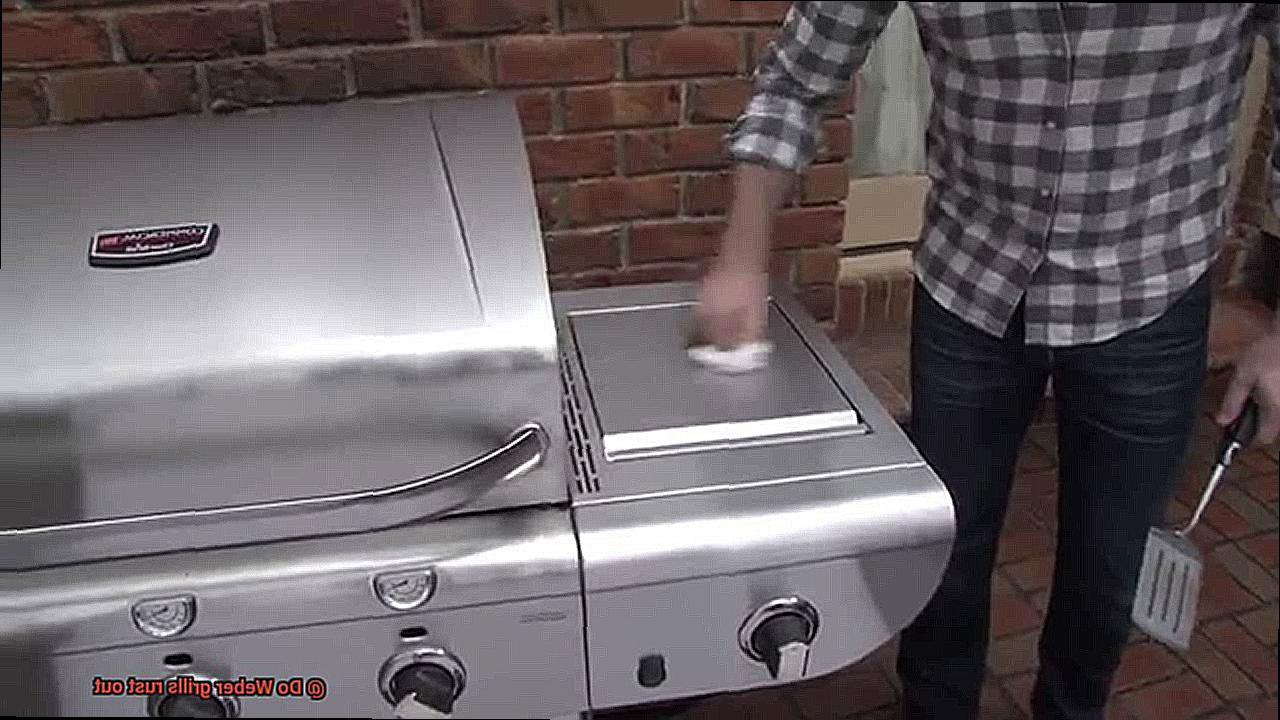
Different Types of Weber Grills and Their Susceptibility to Rust
Grilling is a beloved pastime that brings people together over delicious meals. Weber grills are a top choice for many grill enthusiasts, but even the best grills can be susceptible to rust over time. As an expert on different types of Weber grills and their susceptibility to rust, I’m here to provide detailed information on each type and how to prevent rust from taking hold.
Gas Grills
Weber gas grills are the most popular type of grill and feature porcelain-enameled lids and bowls that protect the steel from rusting. They also have stainless steel burners and cooking grates that are resistant to rust and corrosion. However, parts such as the burners can still rust if not properly maintained. To keep your gas grill in top condition, clean the cooking grates regularly with a brush or scraper. Use a mild detergent and warm water to clean the exterior of the grill. Store your grill in a dry place when not in use and invest in a high-quality cover to protect it from the elements.
Charcoal Grills
Weber charcoal grills are another popular choice among grill enthusiasts and are made of heavy-duty steel. While they feature a porcelain-enameled lid and bowl that provides protection against rust, the grates can still rust if not cleaned and oiled regularly. To prevent rust buildup on your charcoal grill, clean the cooking grates after each use with a brush or scraper. Apply vegetable oil to the grates before cooking to create a non-stick surface that prevents rust.
Electric Grills
Weber electric grills are designed for indoor use and typically have a porcelain-enameled cooking grate and aluminum body, both of which are resistant to rust. However, the heating element can still rust if exposed to moisture. To keep your electric grill in top condition, clean the cooking grate after each use with a brush or scraper. Use a mild detergent and warm water to clean the exterior of the grill.
Factors That Increase the Risk of Rust on Weber Grills
Moisture is undoubtedly the arch-nemesis of your grill’s metal components. If left exposed to rain, snow, or even high humidity levels, moisture can quickly cause rust formation. Therefore, it’s crucial to protect your grill from the elements and keep it dry to prevent rust buildup.
But that’s not all – lack of maintenance can also contribute to rust formation. When you neglect to clean and oil your grill regularly, grease and food particles left on the surface can trap moisture and accelerate the rusting process.
Using harsh chemicals or abrasive cleaners can also damage the metal components of your grill, making them more susceptible to rust. If your grill is exposed to saltwater air or harsh chemicals in a pool area, it may be more prone to rust formation.
Another factor to consider is the quality of materials used in your grill. Cheaper models may feature lower quality materials that are more prone to rust over time. Investing in a high-quality Weber grill with durable materials will save you from the headache of rust formation down the road.
To prevent rust formation on your Weber grill, regular cleaning with mild soap and water followed by a thorough rinse and drying is essential. Applying a thin coat of vegetable oil or another high smoke point oil after each use can also help protect against rust formation. And if possible, store your grill in a dry, protected area when not in use.
In summary, protecting your Weber grill from moisture, maintaining it with regular cleaning and oiling, avoiding harsh chemicals and abrasive cleaners, investing in a high-quality model with durable materials, and storing it in a dry place will ensure that your grill stays rust-free for many years of delicious grilling ahead.
Signs of Rust on Weber Grills
Rust is not only an eyesore, but it can also compromise the structural integrity of your grill and taint the taste of your food. That’s why it’s crucial to know the signs of rust on your Weber grill and how to prevent and treat it.
One of the most obvious signs of rust on Weber grills is discoloration. Keep an eye out for any brown or orange spots on the exterior or interior of your grill, as they could be an indication of rust. Another telltale sign is if you see any flakes or chips in the paint or coating on your grill. This could mean that rust has eaten away at the metal beneath the surface.
Don’t forget to inspect your grates and burners for rust as well. Rust can weaken these components over time, leading to cracks, holes, or thinning areas in the metal. It’s worth noting that rust can also develop inside your grill, in hard-to-reach areas like the bottom of the cooking chamber or around the ash catcher. To check for internal rust, use a flashlight to look inside or remove any removable parts for a closer inspection.
To maintain your Weber grill’s longevity and performance, it’s important to stay vigilant about these signs of rust. In addition to monitoring for rust, there are preventative measures you can take such as covering your grill when not in use, keeping it clean and dry, and applying a protective coating.
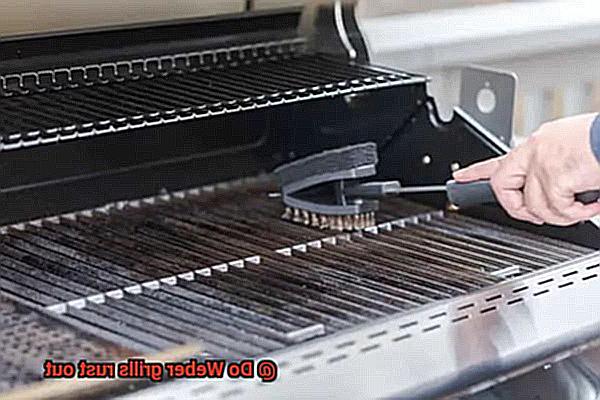
If you do notice signs of rust on your Weber grill, don’t panic. There are steps you can take to treat it such as using a wire brush to remove surface rust and applying a rust converter or inhibitor. With proper care and attention, your Weber grill can continue to be a reliable source of delicious grilled meals for years to come.
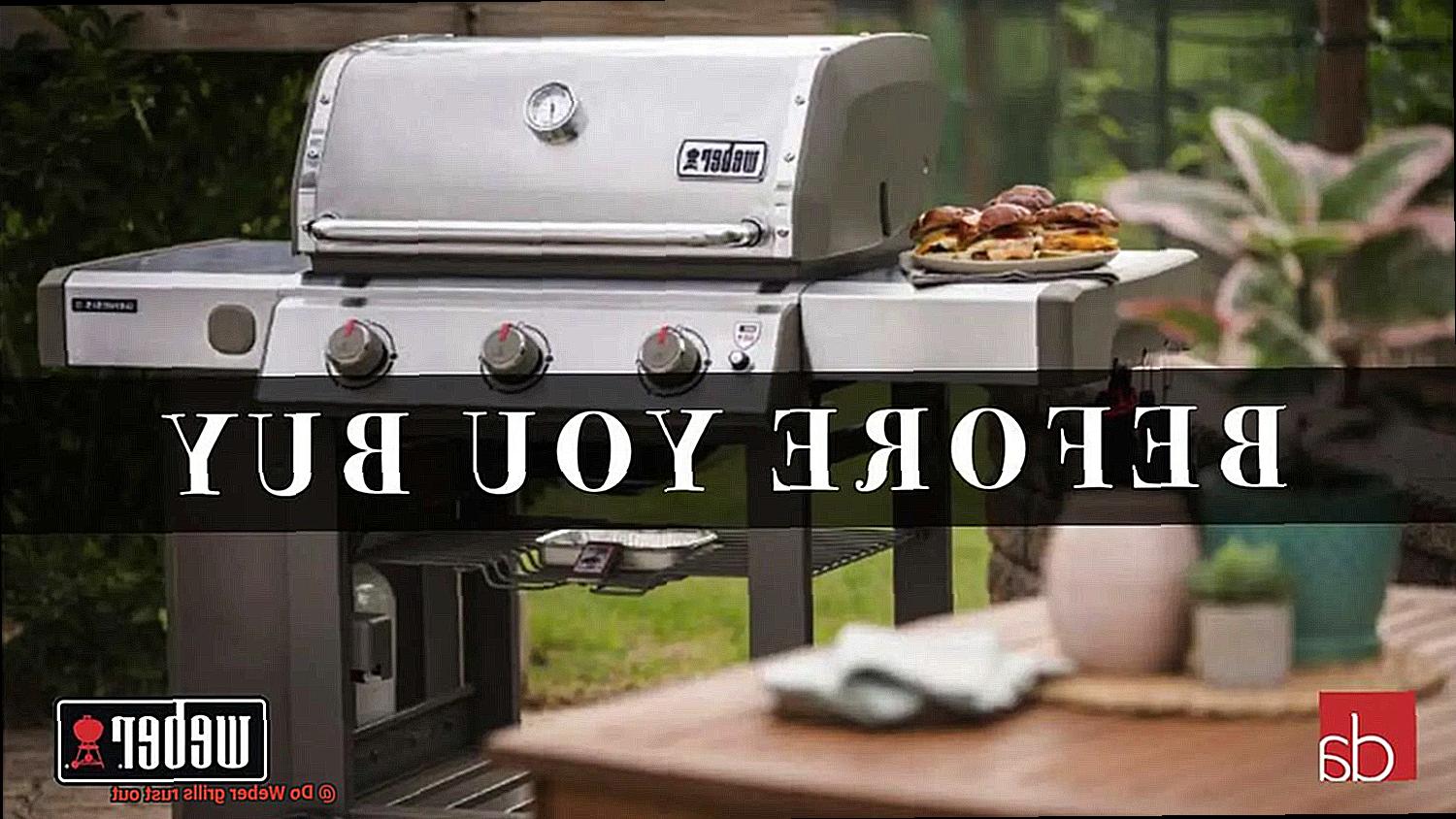
Prevention and Maintenance Tips for Avoiding Rust on Weber Grills
We all know that rust is the enemy of all things metal, and your Weber grill is no exception. Rust can not only make your grill unsightly, but it can also weaken its structure and affect its performance over time. Luckily, there are several steps you can take to prevent and maintain rust on your Weber grill.
Keep it clean
The first step in preventing rust on your Weber grill is to keep it clean. Regularly scrubbing the grates with a grill brush and wiping down the exterior with a damp cloth can help prevent rust from forming. Additionally, be sure to empty the grease tray after each use to prevent buildup.
Protect it from the elements
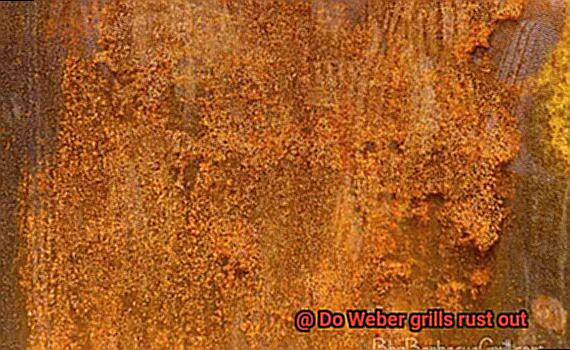
Your Weber grill is designed to be used outdoors, but exposing it to the elements can cause rust to form. If possible, store your grill in a dry, covered area when not in use. If you must leave it outside, consider investing in a weather-resistant cover to protect it from rain and snow.
Use a high-quality cover
Using a good cover can help prevent rust by keeping moisture out. However, it’s important to make sure your grill is completely dry before covering it up to avoid trapping any moisture inside.
Apply a protective coating
Applying a protective coating can help prevent rust from forming on your Weber grill. Some experts recommend using a high-temperature paint or a specialized rust-preventative spray to protect the exterior of your grill.
Inspect regularly
Even with proper care and attention, rust can still form on your Weber grill over time. That’s why it’s important to inspect your grill regularly for signs of rust formation. If you do notice any rust forming, use a wire brush or sandpaper to remove it before it spreads. Then, apply a rust inhibitor or primer to prevent further corrosion.
Cleaning and Repairing a Rusted Grill
As grilling season approaches, the last thing you want to see is a rusty grill. Not only is it unsightly, but rust can also impact the performance of your Weber grill and even pose a health risk. Fortunately, cleaning and repairing a rusted grill is a relatively simple task that any grill owner can do.
To begin, remove all the grates and burners from your grill and brush off any loose rust and debris with a wire brush. Next, create a paste by mixing equal parts of baking soda and water and apply it to the affected areas. Let it sit for several minutes before scrubbing it off with a non-abrasive sponge or cloth. If the rust is stubborn, don’t hesitate to use sandpaper or steel wool to tackle those tough spots.
Once you’ve successfully cleaned the rusted areas, make sure to rinse them thoroughly with water and dry them with a towel. To prevent further rusting, consider applying a rust inhibitor spray or paint.
If the burners are rusted beyond repair, replacing them is the best course of action. Weber offers replacement burners that are easy to install. Just be sure to clean the inside of your grill thoroughly before installing new burners to remove any debris or rust.
To keep your Weber grill in tip-top shape, regular maintenance and cleaning are essential. Protect your grill from rust by keeping it clean and dry, protecting it from the elements with a high-quality cover, applying a protective coating, and inspecting it regularly.
yuDwSi458Ro” >
Conclusion
In summary, Weber grills are designed to withstand the test of time with top-notch materials and a porcelain enamel coating that shields against rust and corrosion. However, if the coating chips or cracks, the metal beneath becomes susceptible to rust. Rust can lead to a decline in quality and lifespan of your grill, compromise its structural integrity, impact its performance over time, and even affect the flavor of your food.
To prevent rust on your Weber grill, it’s crucial to keep it clean by regularly washing it with mild soap and water followed by thorough rinsing and drying. Additionally, applying a thin layer of vegetable oil or another high smoke point oil after each use will help protect it from moisture. Investing in a durable model made from sturdy materials is also key. When not in use, store your grill in a dry place with a good cover to shield it from rain and snow. Regularly inspecting it for signs of rust formation is also recommended.
If you do happen to notice signs of rust on your Weber grill, don’t fret. You can take action by using a wire brush to eliminate surface rust and applying a rust converter or inhibitor. With proper care and attention, your Weber grill can continue to serve up mouth-watering grilled dishes for years on end.

